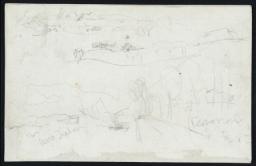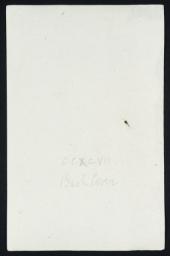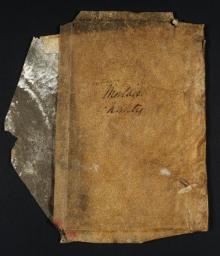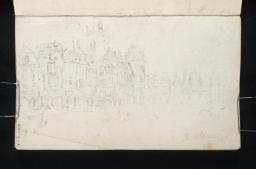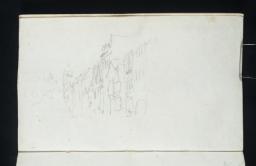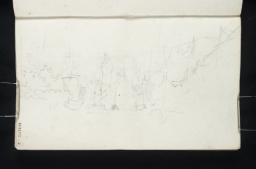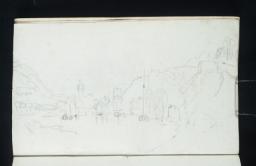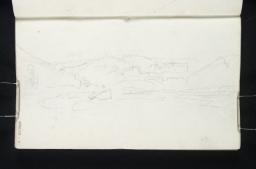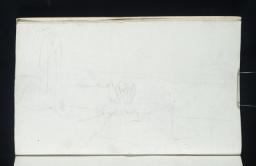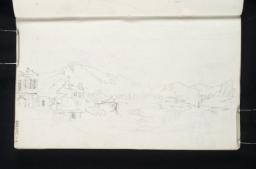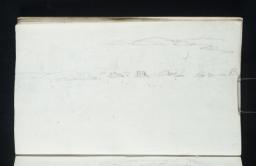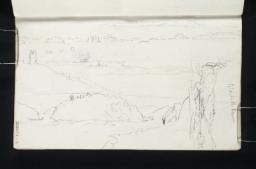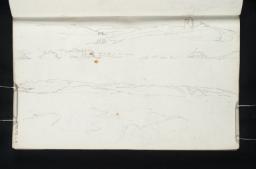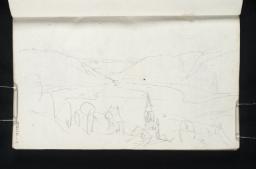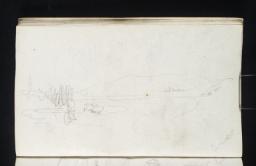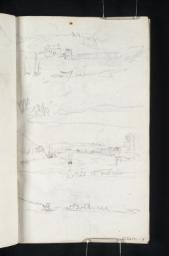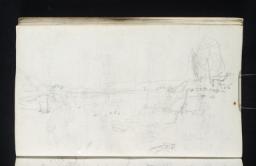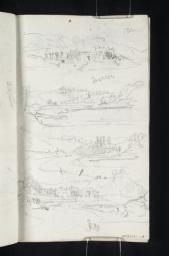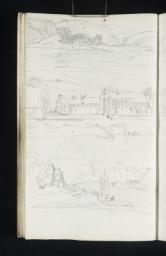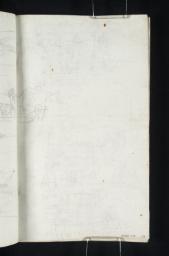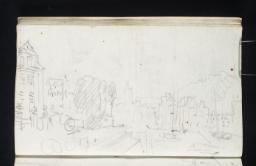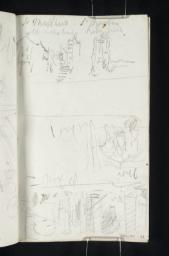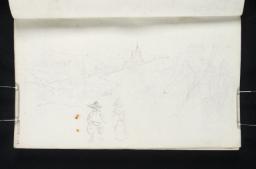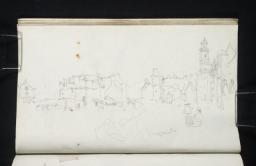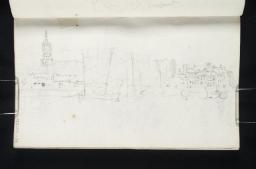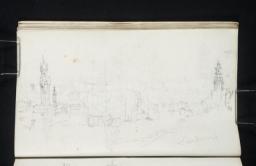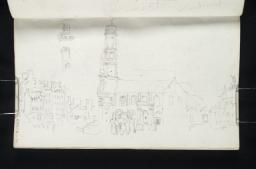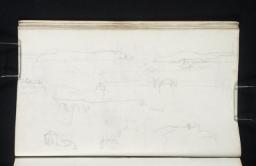Turner Bequest CCXLVII
Sketchbook bound in marbled paper
89 leaves of white laid paper
Approximate page size 167 x 105 mm
Inscribed in pencil on inside front cover ‘CCXLVII’ top left
89 leaves of white laid paper
Approximate page size 167 x 105 mm
Inscribed in pencil on inside front cover ‘CCXLVII’ top left
Accepted by the nation as part of the Turner Bequest 1856
Exhibition history
References
This slim pocketbook of white laid paper contains pencil drawings of the Brittany towns, coastal terrain and countryside through which Turner travelled in the autumn of 1826. The volume retains the title, Morlaise to Nantes, which Turner inscribed on its parchment cover (now detached) complete with the misspelling of the town of Morlaix. This title, along with notes on various folios and corroborating evidence from French regional archives, has allowed Tate curator Ian Warrell to track fairly precisely the artist’s journey around the Brittany coastline from Morlaix to Nantes in relation to his use of the sketchbook.1
It is likely that the great popularity of picturesque and antiquarian French subjects amongst British audiences around this time provided an important motivation for the 1826 visit to Northern France. The journey through Brittany recorded here seems to have been preceded by a tour through Upper Normandy, a region which had already proved a rich source of successful subjects for English painters and printmakers.2 Brittany, meanwhile, like the River Loire which formed the subsequent leg of the tour, was less well-known, and promised a rather fresher supply of wooded riverside views, rocky coastlines, and medieval settlements, and such scenes duly fill the pages of Morlaise to Nantes.
Initially, Turner appears to have filled the volume systematically as he made the journey round the tip of the Breton Peninsula from Morlaix to Quimper via the towns of Brest, Landerneau, and Le Conquet. However, the regular sequence in which these locations are recorded in the first pages of book breaks down once the artist arrived at Quimper, which is documented in haphazard fashion through the later folios. Scenes of Lorient and the wealthy Atlantic port city of Nantes, which is the single most extensively documented urban site in the volume, were recorded in whatever empty pages remained between the various drawings of Quimper. In terms of the precise dating of the tour, useful clues have survived. In the Archives Municipales de Brest, curators Annie Henwood and René Le Bihan found Turner’s name in the town register of travellers, which record his arrival on Saturday 23rd of September and his departure for Lorient the following day.3 A note on folio 87 verso reading ‘Nantes = 1 / 2 October’ indicates that he arrived in the city around a week later.
The Breton sites which seem to have interested Turner most feature in the sketchbook in the following groupings:
Morlaix: Folios 1 Recto to 3 Recto (D23011–D23015; Turner Bequest CCXLVII 1–3); 4 Recto (D23017; Turner Bequest CCXLVII 4); 4 Verso (D23018; Turner Bequest CCXLVII 4a); 7 Recto to 11 Recto (D23022–D23030; Turner Bequest CCXLVII 7- 11).
Landerneau: Folios 12 Verso to 13 Verso (D23032–D23034; Turner Bequest CCXLVII 12a–13a).
Brest: Folios 14 Recto (D23035; Turner Bequest CCXLVII 14); 14 Verso (D23036 Turner Bequest CCXLVII 14a); 16 Recto to 17 Recto (D23039–D23041; Turner Bequest CCXLVII 16–17).
Nantes: Folios 31 Recto to 32 Recto (D23067–D23069; Turner Bequest CCXLVII 31–32); 33 Recto (D23070; Turner Bequest CCXLVII 33); folio 33 verso (D23071; Turner Bequest CCXLVII 33a); 36 Recto (D23075; Turner Bequest CCXLVII 36); 37 Verso (D23077; Turner Bequest CCXLVII 37a); 38 Recto (D23078; Turner Bequest CCXLVII 38); 44 recto (D23084; Turner Bequest CCXLVII 44); 48 Recto (D23089; Turner Bequest CCXLVII 48); 48 Verso (D23090; Turner Bequest CCXLVII 48a); 50 Recto (D23092; Turner Bequest CCXLVII 50); folio 51 verso (D23094; Turner Bequest CCXLVII 51a); folio 53 verso (D23098; Turner Bequest CCXLVII 53a); 54 Recto (D23099; Turner Bequest CCXLVII 54); 55 Verso (D23101; Turner Bequest CCXLVII 55a); 56 Verso (D23103; Turner Bequest CCXLVII 56a); 57 Recto (D23104; Turner Bequest CCXLVII 57); 58 Verso (D23106; Turner Bequest CCXLVII 58a); 59 Recto (D23107; Turner Bequest CCXLVII 59); 60 Verso (D23109; Turner Bequest CCXLVII 60a); 61 Recto to 62 Verso (D23110–D23113; Turner Bequest CCXLVII 61–62a); 68 Verso (D23121; Turner Bequest CCXLVII 68a); 69 Recto (D23122; Turner Bequest CCXLVII 69).
Lorient: Folios 65 Recto (D23116; Turner Bequest CCXLVII 65); 72 Verso to 74 Recto
(D23127–D23130; Turner Bequest CCXLVII 71c–73); 88 Recto (D23147; Turner Bequest CCXLVII 87).
(D23127–D23130; Turner Bequest CCXLVII 71c–73); 88 Recto (D23147; Turner Bequest CCXLVII 87).
Technical Notes:
The sketchbook has been rebound since A.J. Finberg described it as ‘bound in parchment’ in his 1909 Inventory.4 The original covers (D40500, D40497) bear Turner’s note, ‘Morlais to Nantes’. Finberg transcribed the notes left by Turner’s executors on the inside cover. These include a signed note by Henry Scott Trimmer reading ‘No.400. Contains 66 leaves, pencil sketches’ and the signature of Charles Turner ‘C. Turner.’ Charles Locke Eastlake and John Prescott Knight each left their initials in pencil. Finberg also noted that four pages had been removed, a comment which has subs connected to the evidence of removed pages between folios 20 and 21.5
John Ruskin numbered the bottom right-hand corner of each recto although most these marks have faded considerably rendering them illegible. Ruskin seems to have missed folio 72 during the pagination process, an error which Finberg subsequently accommodated by assigning the recto and verso of the sheet with the numbers ‘71 b’ and ’71 c’. From folio 73 recto, therefore, the current foliation, the Tate ‘D’ accession numbers, and the Turner Bequest numbers are out of step with one another. A correspondence is therefore provided to clarify these discrepancies:
| Folio | Tate | Turner Bequest |
| 72 Recto | D23126 | CCXLVII 71 b |
| 72 Verso | D23127 | CCXLVII 71 c |
| 73 Recto | D23128 | CCXLVII 72 |
| 73 Verso | D23129 | CCXLVII 72 a |
| 74 Recto | D23130 | CCXLVII 73 |
| 75 Recto | D23131 | CCXLVII 74 |
| 76 Recto | D23132 | CCXLVII 75 |
| 77 Recto | D23133 | CCXLVII 76 |
| 78 Recto | D23134 | CCXLVII 77 |
| 79 Recto | D23135 | CCXLVII 78 |
| 80 Recto | D23136 | CCXLVII 79 |
| 81 Recto | D23137 | CCXLVII 80 |
| 82 Recto | D23138 | CCXLVII 81 |
| 83 Recto | D23139 | CCXLVII 82 |
| 84 Recto | D23140 | CCXLVII 83 |
| 84 Verso | D23141 | CCXLVII 83 a |
| 85 Recto | D23142 | CCXLVII 84 |
| 86 Recto | D23143 | CCXLVII 85 |
| 86 Verso | D23144 | CCXLVII 85 a |
| 87 Recto | D23145 | CCXLVII 86 |
| 87 Verso | D23146 | CCXLVII 86 a |
| 88 Recto | D23147 | CCXLVII 87 |
| 88 Verso | D23148 | CCXLVII 87 a |
| 89 Recto | D23149 | CCXLVII 88 |
| 89 Verso | D23150 | CCXLVII 88 a |
How to cite
John Chu, ‘Morlaise to Nantes Sketchbook 1826’, sketchbook, September 2015, in David Blayney Brown (ed.), J.M.W. Turner: Sketchbooks, Drawings and Watercolours, Tate Research Publication, March 2017, https://www

